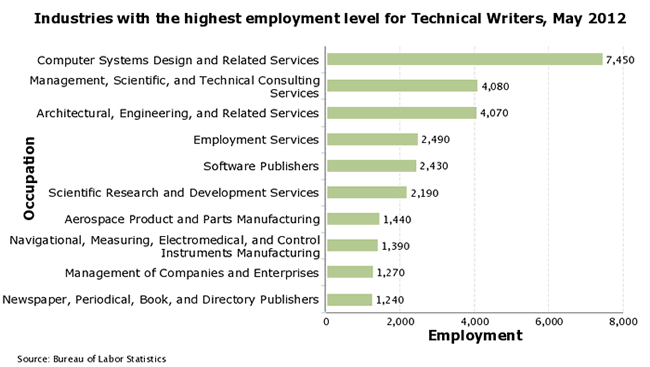Many industries highly value technical writing, and in fact, it’s a growing field. Almost every industry has a place for technical writing in some form, whether that’s instruction manuals, reference documentation, or compliance documentation.
For example, consumer technology – gadgets typically come with printed instruction manuals, but these instructions are also increasingly being made available online.
There are going to be some industries, such as sports and fashion, where very little technical writing will be involved. These industries are not information-heavy, so it will probably be best to steer clear of these industries if you’re looking for a technical writing job.
It might be interesting to learn which industries value technical writers the most since this will likely determine the direction you want your career to take. It also means you’re likely to have more job mobility since there will be more positions available.
Here’s a list of industries that value technical writing:
- Heavy machinery industry
- Software industry
- Automobile manufacturing industry
- Medical industry
- Healthcare sector
- Education sector
- Defence industry
- Aerospace industry
- Consumer electronics industry
Technical writers must be skilled in writing, researching, critical thinking, and technology in general, as well as be good at building internal relationships. A lot of the time, technical writers might also need strong domain-specific knowledge, to produce accurate and thorough documentation about services and products.
Here’s a chart demonstrating the industries that employed the most technical writers in 2012 in the US. As you can see, working in computer systems and related services means you will have the most choice when it comes to what positions are available. This industry is only going to keep growing, too.

Now, we’ll go into some of these industries in a bit more depth.
1. Software Industry
Naturally, the software industry is growing very quickly. There is an increasing demand for writers who can work in software, especially in the API space. You can write developer-to-developer documentation or customer-facing documentation.
If you want to write documentation for the makers of the product then you are much more likely to need software development skills and understand of code, which will enable you to write rigorous docs. If your content is customer-facing, then you need less technical skill because you only have to be able to understand the product from the perspective of an end user.
2. Heavy Machinery and Automobile Industries
Industries like heavy machinery and automobiles deliver products that frequently come with an operator’s manual. Providing appropriate documentation is often a legal requirement.
You will also be producing product descriptions, operating procedures, marketing materials, and catalogs of parts. It’s crucial to follow the activities of the engineering team and keep publications up-to-date.
You might require a degree in mechanical engineering or automobile technology to work in this industry, along with strong language skills.
3. Consumer Electronics Industry
The consumer electronics industry is also growing very quickly, with a large variety of products on offer. You’ll need quite a different mindset from the software industry technical writer because you won’t be producing documentation continuously.
Your work will be more project-focused, with documentation published across different platforms, and you’ll probably need the ability to translate and localise your manuals.
Other consumer products will require assembly manuals, such as toys and furniture. In these cases you may also need strong technical drawing skills.
4. Engineering Industry
If you are going to work in the engineering industry, for example with hardware, then your role is typically to break down complex systems and explain them for the benefit of users. There will also be a strong emphasis on troubleshooting and getting started.
It’s going to be extremely useful if you have engineering experience if you want to work in this industry. You’ll need to focus on being highly technically accurate in your work, since safety and a working product will be the primary aims.
Bart Leahy has a great blog on his work as a technical writer in the space industry.
5. Healthcare Field
The healthcare field is another area where there is a great demand for technical writers. The field of medicine and healthcare is constantly expanding, with new information produced regularly that requires documenting in some way.
You might be writing regulatory documentation, translating research projects for a lay audience, or writing equipment instruction manuals. You might be writing educational and promotional materials for patients or healthcare providers in the form of leaflets and posters regarding diseases or drugs, for example.
This is another field where it very much helps to have a background in the sciences, such as experience in research or in medicine, or education in the life sciences. If you have the relevant experience, you’ll be able to work closely with scientists to turn their work into effective research papers.
Also Read: Guide to Improve Healthcare Process
6. Aerospace and Aviation Industry
A huge amount of documentation is required in the aviation industry, with many activities requiring repeatable instructions. The Aviation Authority enforces very strict guidelines in every country regarding the design, operations, and maintenance of aircraft since the safety risks are significant.
Imagine yourself being the person to write the well-known flight safety manual, many of which are approaching works of art!
To work in this industry, you need to be familiar with aircraft systems, and also be educated to a degree level in aeronautical or aircraft maintenance engineering at a minimum.
7. Education Sector
There is a high demand for technical writers in the education sector. You could be responsible for writing training courses for students, or designing e-learning programs. Technical writers in this field are often called Instructional Designers, and you’ll need a background in standard educational practices.
You could be writing the content of courses or explaining to users how to operate the system. Alternatively, you could find work writing textbooks and other learning materials for students.
Final Remarks
Many technical writers are primarily writing how-to manuals, but other common forms of technical writing include writing grants, proposals, project and business analysis documents, and reports.
Any industry that is tightly regulated will have a greater demand for technical writers. This can be both a blessing and a curse. On the one hand, your role will be very important, but on the other hand you might be working with quite a large amount of dry material! This type of work will also require more extensive skill in that particular domain.
Strike a balance between finding work you enjoy within a field that has potential for career development.
Strike a balance between finding work you enjoy, within a field that has potential for career development. Seek to network with other industry professionals, either on social media or through communities like Write the Docs.
Also Read: 10 Most Popular Tools for Technical Writing





 –
– 

